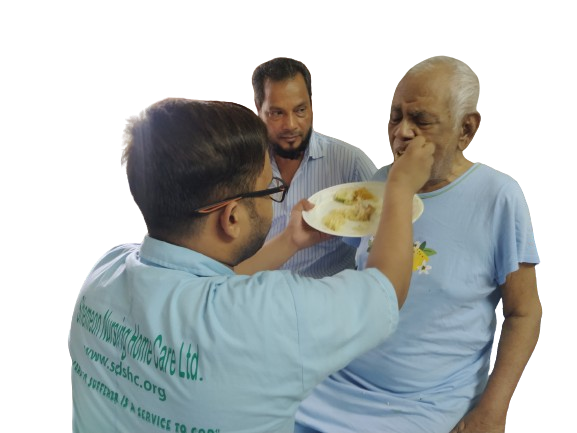ICU, HDU, Neuro ICU( Tracheostomy / PEG Tube ) Patients Care
Care for patients in critical care units such as ICU, HDU, and Neuro ICU with tracheostomy or PEG tubes requires specialized attention and monitoring.
We are Committed to
All Clients are Supervised Regularly
Regular Home Visits. Evaluation and monitoring integrated nurses progress. Revising update nursing care plan. 24/7 Phone Support.
Your Choice
Your care is completely determind by you. You determind the type of care, How it is delivered and who delivers it.
SUPPORT FOR YOU 24/7
Our tem are on-call 24/7, so we can help you when you need us the most.
LEVEL : 1 (RN)
Critical Care Nursing : Where require continuous vitals monitoring such as ICU, HDU, NICU, PICU, Neuro - ICU , Patients,. Which covers Tracheostomy (TT) care, Pressure Sore Intake Output, PEG / NG, Feeding tube, Suction & Nebulization, CV / Dialysis Catheter Care, CPAP - BIPAP, Ventilated and daily others necessary nursing care.
LEVEL : 3 (NT)
Nursing Technician : General Nursing Certified Care Based experienced to manage daily bedside care needs. Such as NG Feed Suction, Chest Physiotherapy, Inaulin given and many more bedside care activities according to nursing care plan.


ALLOCATION
6 (Six) Hours.
8 (Eight) Hours.
12 (Twelve) Hours.
24 (Twenty four) Hours.
Emergency Medical Support.
LEVEL : 2 (RN)
General Care Nursing : Will take wound care to Basic life support care. eg ; NG Feeding, Suction & Nebulization, IV Cannual, Urinary Catheter, Minor Dressing, Medication and other routine nursing care.
LEVEL : 4 (PCA)
Nursing Technician : Community Care Assistant (CCA) : Designed to assist with your daily bedside Necessity. eg; Helping to bath, Oral Feeding, Diaper Changing, Positioning, Mobilization, Walking Support and many more.
Caregaiver have been screened PTB & Vaccinated.
Drug & alchol abuse background check.
Trained about basic infection control & CPR, AED.
Our Documentation
Specialized facilities like hospitals and clinics provide advanced care and technology for critically ill patients in ICU, HDU, and Neuro ICU with tracheostomy or PEG tubes.
If you need urgent care, simply call our 24 hour emergency hotline.
Your personal case manager will ensure that you receive the best possible care.

Frequently Asked Questions
ICU (Intensive Care Unit) is a specialized unit within a hospital that provides around-the-clock care for critically ill patients who require close monitoring and support for life-threatening conditions. HDU (High Dependency Unit) is an intermediate level of care between the ICU and general ward for patients who require a higher level of monitoring and support than can be provided on a general ward but do not require the level of care provided in the ICU. Neuro ICU is a specialized ICU that focuses on the care of patients with neurological conditions such as stroke, brain injuries, or tumors. Patients in a Neuro ICU often require specialized monitoring and interventions to manage their neurological conditions.
A tracheostomy is a surgical procedure where an opening is made in the front of the neck and a tube is inserted into the windpipe (trachea). This creates a direct airway to help a patient breathe when they are unable to do so on their own due to illness or injury. Tracheostomies are often necessary for patients in the ICU who require prolonged mechanical ventilation or who have an obstruction in their upper airway that cannot be relieved with other methods. Tracheostomies may also be done for patients who need prolonged airway access for other reasons, such as frequent suctioning of secretions or medication administration.
A PEG tube (percutaneous endoscopic gastrostomy tube) is a medical device that is used to provide nutrition to patients who cannot eat or swallow food due to illness or injury. It is a tube that is inserted through the abdominal wall directly into the stomach, bypassing the mouth and throat. PEG tubes are often necessary for patients in the ICU who require prolonged nutritional support or who are unable to eat or swallow due to injury or illness. They may also be used for patients who require frequent medication administration or for those who are at risk of aspiration (inhaling food or liquid into the lungs). PEG tube placement is typically done with endoscopic guidance under sedation or anesthesia.
Patients in the ICU, HDU, and Neuro ICU are monitored closely with advanced medical technology to detect and manage changes in their condition. This includes continuous monitoring of vital signs such as heart rate, blood pressure, respiratory rate, and oxygen saturation. They may also be monitored with electrocardiography (ECG), pulse oximetry, invasive or non-invasive blood pressure monitoring, intracranial pressure monitoring, and other specialized devices depending on their specific condition. Additionally, patients may undergo frequent laboratory tests, imaging studies, and other diagnostic procedures to monitor their organ function and response to treatment.
Complications associated with tracheostomy or PEG tube placement may include bleeding, infection, displacement or dislodgement of the tube, injury to surrounding structures, difficulty with insertion, or complications associated with sedation or anesthesia. Patients may also experience pain, discomfort, or swelling at the site of the procedure. Additionally, patients with tracheostomy tubes may be at risk of developing complications such as airway obstruction, tube occlusion, pneumothorax (collapsed lung), or tracheal stenosis (narrowing of the trachea). Patients with PEG tubes may be at risk of developing complications such as infection, peritonitis (inflammation of the abdominal lining), or tube displacement or obstruction. It is important for healthcare providers to monitor patients closely for signs of complications and to provide appropriate management and intervention as needed.
What Our Client Says
Care to A Sufferer is services to God.




















